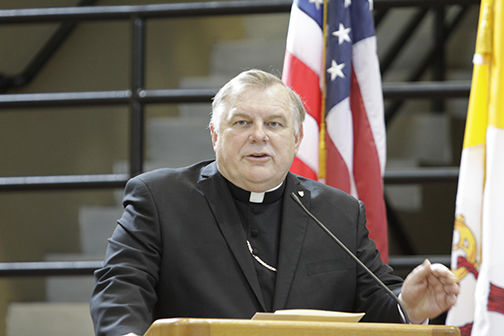This week’s passage of the Farm Bill in Congress received a mixed reaction from U.S. bishops and other Catholic leaders in social services, who deplored the bill’s funding cuts in food stamp programs.
A compromise version of the nearly $1 trillion measure was sent to President Obama after its passage in the Senate Feb. 4. The House passed the bill, known as the Federal Agriculture Reform and Risk Management Act, on Jan. 29 by a vote of 251-166.
“We are disappointed that the final compromise continues to call disproportionately for sacrifices from hungry and poor people in this country and around the world, especially when large industrial agricultural operations continue to receive unnecessary subsidies,” Archbishop Thomas Wenski of Miami said Jan. 29.
At the same time, “we are glad to see support will continue for domestic and international nutrition and development aid, rural development and conservation,” said the archbishop who chairs the USCCB Committee on Domestic Justice and Human Development.
The bill’s passage was sharply criticized by the National Council of La Raza, which asserted that the Supplemental Nutrition Assistance Program, formerly known as food stamps, will suffer from more than $8 billion in budget cuts.
Although the final bill did not include a number of eligibility restrictions that had been put forward, “this dramatic reduction in funds will deeply impact the millions of families who rely on the program to put food on their tables,” said said Janet Murguía, La Raza president and CEO.
“It is deplorable that our government officials recently spoke about addressing income inequality and helping the long-term unemployed but Congress still voted to cut $8 billion from SNAP,” said Murguía. “Instead of investing in the health our children, our leaders have reduced an average of $90 per month in needed food assistance to over 850,000 low-income families. This logic will only exacerbate hunger, threaten our economy and jeopardize our nation’s future.”
The U.S. bishops vocally opposed cuts and changes to some programs funded by the bill, including the food stamp program. The bill calls for $8.6 billion in cuts to the program over 10 years by increasing the threshold of eligibility for participants in the federal government’s low-income home energy assistance programs.
Despite this, the bill provides some increases for the Emergency Food Assistance Program.
The bishops have said the farm bill should prioritize the poor and hungry, serve small and medium-sized family farms, support sustainable farming, and help vulnerable farmers and communities around the world, the U.S. bishops’ conference said.
Bishop Richard Pates of Des Moines, chair of the U.S. bishops' Committee on International Justice and Peace, welcomed Congress' “renewed commitment” to programs that “tackle root causes of chronic hunger.” He voiced appreciation for the bill’s “foresight” in making programs more cost effective to help serve more people with limited resources.
Bishop Pates and Catholic Relief Services president Carolyn Woo voiced support for the international food assistance funding in the bill. They also supported changes intended to increase programs’ efficiency.
Father Larry Snyder, president of Catholic Charities USA, was concerned that the “most vulnerable” will “bear the greatest burden” of budget cuts for anti-poverty programs.
“However, we realize that tough choices may have to be made,” he continued. He encouraged U.S. leaders to “commit to ensuring that millions of our brothers and sisters are not being left out or left behind.”
Sheila K. Gilbert, president of the National Council of the Society of St. Vincent de Paul, joined Father Snyder in noting the challenges that her organization and Catholic Charities agencies face in helping to serve those in need.
Catholic News Agency contributed to this story.

